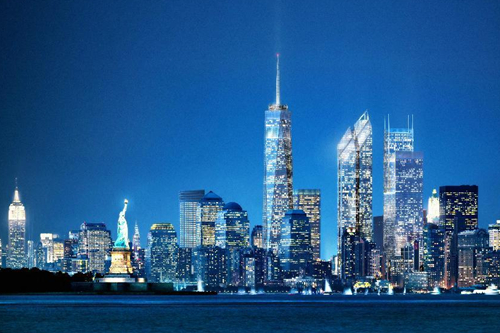9/11: Counting the cost a decade on
- By Tylor Claggett
 0 Comment(s)
0 Comment(s) Print
Print E-mail
China.org.cn, September 10, 2011
E-mail
China.org.cn, September 10, 2011
|
|
|
This is a rendering of the future World Trade Center issured at the World Trade Center rebuilding update news conference held in New York, the United States, on Sept. 7. 2011. The World Trade Center site in Lower Manhattan is being rebuilt with new skyscrapers and a memorial to the casualties of the 9/11 attacks. [Xinhua] |
Soon, it will be ten years since the tragic events of September 11, 2001. It is safe to say, the world has changed significantly since then. Not surprisingly, much has already been written about all of the changes, impacts and consequences. To their credit, many of the authors of these pieces have succeeded in describing various subtle, and not so subtle, aspects of the multitude of transformations we have witnessed. I hope to do the same with this editorial.
Immediately after 9/11, there was widespread fear in US society. As then Vice President Cheney said in his newly published book, In My Time, "we were in the fog of war." This widespread fear influenced individuals, businesses, institutions and national policy. The week leading up to the ten-year 9/11 anniversary saw the US's National Public Radio (NPR) network air a series of programs that reminded its listeners of the costs to society that can be directly traced to terrorism in general and to the events of 9/11 in particular.
Rightly or wrongly, it can be said that much of the motivation for the wars in Iraq and Afghanistan stemmed, in large part, from fear of a future 9/11. The cost of these wars is estimated to be in the trillions of dollars - and still counting. Then, there is the cost of national homeland security including national, state and local expenditures. Again, these costs are estimated to be in the trillions of dollars. Next, there are the indirect costs, such as the millions of hours spent by the public waiting in airport security lines and the billions of dollars in interest payments paid on borrowed money used to pay for the wars and security.
It is not too far of a stretch to extend these costs to the current political gridlock in the US government, which is fostered by the unacceptable national debt and pervasive fiscal irresponsibility - much of it the result of 9/11. If this is indeed the case, the societal and political costs of 9/11 become even more astronomical. But wait, even more extrapolation can be done. One can make the argument that the political chaos and the accompanying economic doubt has contributed greatly to the US's inability to recover from the 2008-09 financial crisis. The ongoing high unemployment costs, which include social wreckage such as substance abuse and failed marriages, in addition to lost productivity, add significantly more to the total. Furthermore, a widespread perception of uncertainty makes business managers reluctant to hire, invest and otherwise expand. Bottom line: There are trillions and trillions of dollars in '9/11 opportunity costs' and the true cost of 9/11 cannot be measured.
Some writers have drawn a parallel between the events of 9/11 and the attack on Pearl Harbor in December of 1941. They point out that the US was forever changed by Pearl Harbor and the same has been said about the US with respect to 9/11. In both cases, Americans feared for their physical safety while their daily lives were altered in many ways long after the violence. However, there is one very important difference which I believe has been grossly overlooked.
While Pearl Harbor was "a day which will live in infamy," the struggle that followed had an anticipated ending. The Japanese defeat in August of 1945 brought the struggle to an end and Americans felt they could move on. Today, ten years after 9/11, the war on terrorism is ongoing with no end in sight. Culturally, Americans are programmed to believe they can solve problems rather quickly and, once the problem is solved, move on to better and more productive activities.
Today, Americans have no illusions that pre-9/11 normality, such as not having to wait for airport security checks, will ever return.
The public is reminded daily that society must keep its guard up indefinitely; with all of the before mentioned associated costs. That belief alone is very depressing, and it is a significant drag on national morale that will remain for a long time to come.
The author is a columnist with China.org.cn. For more information please visit: http://www.ccgp-fushun.com/opinion/tylorclaggett.htm
Opinion articles reflect the views of their authors, not necessarily those of China.org.cn.






